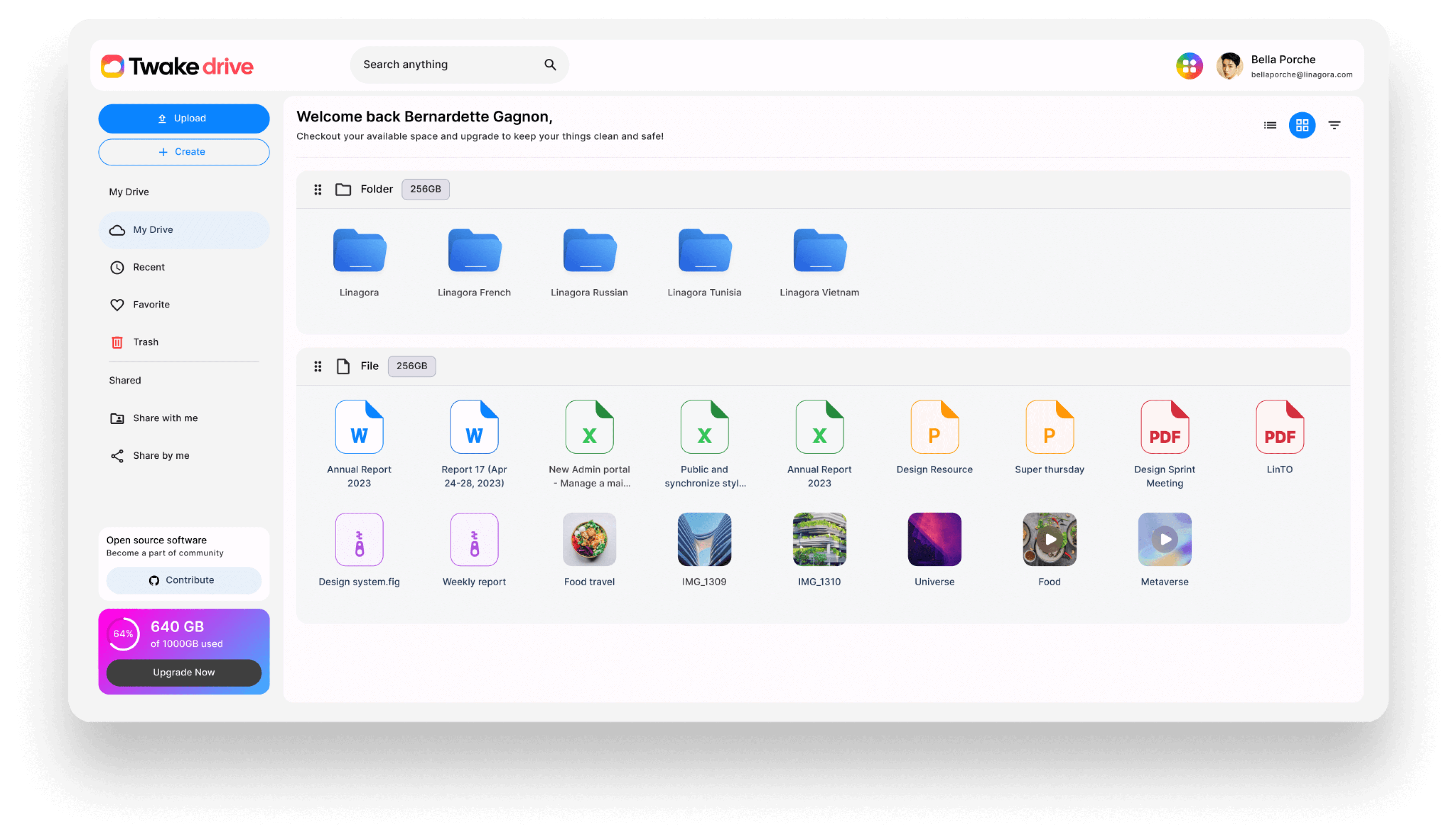At a time when document management and file sharing have become indispensable in the professional world, companies are looking for reliable, secure tools that respect their digital sovereignty needs. Collaborative storage solutions are numerous, but not all address transparency, interoperability, and compliance challenges in the same way. In this article, we provide a comparison between Twake Drive, an open‑source enterprise solution developed by LINAGORA, and Owncloud, a well‑known alternative that presents certain limitations. The goal is to highlight the differences between these two approaches and help organisations choose the storage solution that best fits their needs.

Comparative Table Twake Drive vs Owncloud
| Criteria | Twake Drive | Owncloud |
|---|---|---|
| Origin | Developed by LINAGORA, a recognised player in French free software | Developed in Germany by Owncloud GmbH |
| License | 100 % free‑software support, based on transparent governance | Open‑source software, but some advanced features are reserved for the paid version |
| Collaborative Integration | Natively integrated into the Twake Workplace suite (chat, tasks, calendar) | Limited features, additional integrations required |
| Hosting | Available as open‑source drive self‑hosted or on sovereign cloud | Primarily self‑hosted, cloud integrations depend on third‑party providers |
| Security & Compliance | Complies with European standards and emphasizes data sovereignty | Robust security but heavily dependent on user configuration |
| Accessibility & Usability | Modern interface designed for a collaborative user experience | Functional interface but less intuitive |
| Community & Support | Backed by LINAGORA with professional free‑software support | Large open‑source community, official support limited to commercial offers |
| Added Value for Enterprises | Designed as an open‑source enterprise solution, with native features | More oriented toward individuals and SMEs with limited needs |
Why Choose Twake Drive
Twake Drive positions itself as an open‑source enterprise solution built to meet modern collaboration challenges. Developed by LINAGORA, a recognised player in French free software, Twake Drive follows an open‑innovation logic and respects digital sovereignty.
One of Twake Drive’s strengths lies in its native integration with Twake Workplace. Unlike Owncloud, which mainly focuses on file management, Twake Drive integrates directly with communication tools (chat), project‑management tools (tasks) and organisational tools (calendar). This enables companies to have a true, complete collaborative platform without relying on third‑party solutions.
In terms of deployment, Twake Drive offers notable flexibility. Available as a open‑source drive that can be self‑hosted or accessed via sovereign cloud services, it allows organisations to retain full control over their data—a crucial criterion for public institutions and companies sensitive to confidentiality issues. This focus on digital sovereignty constitutes a strategic advantage over solutions that depend on foreign providers.
Security is also at the heart of Twake Drive’s philosophy. The open‑source approach guarantees total transparency of the code, while the free‑software support provided by LINAGORA ensures professional assistance for critical deployments. This combination gives companies a reliable, sustainable environment with the confidence that the solution will evolve in line with market standards.
Finally, Twake Drive stands out for its modern ergonomics and intuitive interface, designed for rapid adoption by teams. Unlike solutions sometimes perceived as complex, Twake Drive emphasises a fluid experience, essential for fostering productivity and user acceptance.
Why Use Owncloud
Owncloud is an open‑source solution that has largely contributed to democratising self‑hosted file sharing. Developed in Germany, it benefits from a solid community and offers an effective functional base for companies looking to implement a simple, secure storage solution.
However, Owncloud shows several limitations when it comes to integration and collaboration. Unlike Twake Drive, Owncloud does not natively include project‑management or communication features. To obtain a complete collaborative experience, companies must resort to integrations or extensions, which increase maintenance effort and can generate additional costs.
Moreover, while Owncloud’s security is recognised, it heavily depends on the configuration set up by each administrator. This flexible approach can become complex for organisations seeking a turnkey solution with professional free‑software support. Finally, some advanced features are only available in commercial editions, limiting access to more demanding use‑cases in the community version.
Owncloud therefore remains an interesting choice for SMEs or teams with limited needs, but it reveals its limits compared with integrated solutions designed from the outset for enterprise use.
Conclusion
Twake Drive and Owncloud address similar needs regarding file sharing and collaborative storage solutions, yet their orientations differ. Owncloud offers an effective, proven solution for users wanting a simple, storage‑centric approach, while Twake Drive goes further by providing an integrated, modern open‑source enterprise solution that respects digital sovereignty.
For organisations seeking a comprehensive collaborative platform backed by a recognised player in French free software, Twake Drive today represents the best alternative to Owncloud. Thanks to its native integration, deployment flexibility, and free‑software support, Twake Drive stands out as the strategic choice for companies aiming to adopt a solution that is performant, ethical, and sustainable.

